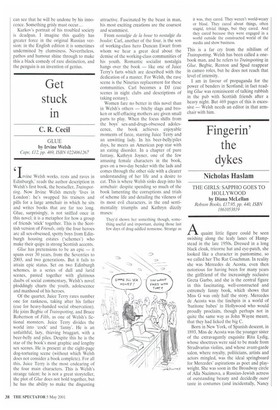Get stuck in
C. R. Cecil
GLUE
by Irvine Welsh
Cape, £12, pp. 469, ISBN 0224061267
Irvine Welsh works, rests and raves in Edinburgh.' reads the author description in Welsh's first book, the bestseller, Trainspotting. Now Irvine Welsh merely 'lives in London': he's swapped his trainers and pills for a large armchair in which be sits and writes books that are far too long. Glue, surprisingly, is not sniffed once in this novel; it is a metaphor for how a group of friends 'stick' together. This is the Scottish version of Friends, only the four heroes are all sex-obsessed, spotty boys from Edinburgh housing estates ('schemes') who make their quips in strong Scottish accents.
Glue has pretensions to be an epic — it spans over 30 years, from the Seventies to 2003, and two generations. But it fails to attain epic status. Set on two Edinburgh schemes, in a series of dull and lurid scenes, pasted together with glutinous daubs of social commentary, Welsh's novel ploddingly charts the youth, adolescence and manhood of his heroes.
Of the quartet, Juice Terry rates number one for rankness, taking after his father (cue for heavy-handed social observation). He joins Begbie of Trainspotting, and Bruce Robertson of Filth, as one of Welsh's fictional monsters. Juice Terry divides the world into 'cock' and 'fanny'. He is an unfaithful, lazy, thieving braggart, with a beer-belly and piles. Despite this he is the star of the book's most graphic and lengthy sex scenes. He is present at the eight-page dog-torturing scene (without which Welsh does not consider a book complete). For all this, Juice Terry is the most endearing of the four main characters. This is Welsh's strange talent; he is not a great storyteller, the plot of Glue does not hold together, but he has the ability to make the disgusting attractive. Fascinated by the beast in man, his most exciting creations are the coarsest and scummiest.
From nostalgic de la bone to nostalgic du boulot: Carl, another of the four, is the son of working-class hero Duncan Ewart from whom we hear a great deal about the demise of the working-class communities of his youth. Romantic socialist nostalgia hangs over the book — like one of Juice Terry's farts which are described with the dedication of a master. For Welsh, the rave scene is the Nineties replacement for these communities. Carl becomes a DJ (cue scenes in night clubs and descriptions of taking ecstasy).
Women fare no better in this novel than in Welsh's others — bitchy slags and broken or self-effacing mothers are given small parts to play. When the focus shifts from the boys' sex-and-drugs-obsessed adolescence, the book achieves enjoyable moments of farce, starring Juice Terry and an unwitting lady. In his beer-belly/piles days, he meets an American pop star with an eating disorder. In a chapter of pure fantasy, Kathryn Joyner, one of the few amusing female characters in the book, goes on a two-day bender with the lads and comes through the other side with a clearer understanding of her life and a desire to cat. This is where Welsh sinks deep into his armchair: despite spending so much of the book lamenting the corruptions and trials of scheme life and detailing the vileness of its most evil characters, in the end sentimentality triumphs and Kathryn dizzily muses:
They'd shown her something though, something useful and important, during those last few days of drug-addled nonsense. Strange as it was, they cared. They weren't world-weary or blase'. They cared about things, often stupid, trivial things, but they cared. And they cared because they were engaged in a world outside the constructed world of the media and show business.
This is a far cry from the nihilism of Trainspotting. Welsh has been called a onebook man, and he refers to Trainspotting in Glue. Begbie, Renton and Spud reappear in cameo roles, but he does not reach that level of intensity.
I am in favour of propaganda for the power of benders in Scotland; in fact reading Glue was reminiscent of talking rubbish in the pub with Scottish friends after a heavy night. But 469 pages of this is excessive — Welsh needs an editor in that armchair with him.










































































 Previous page
Previous page